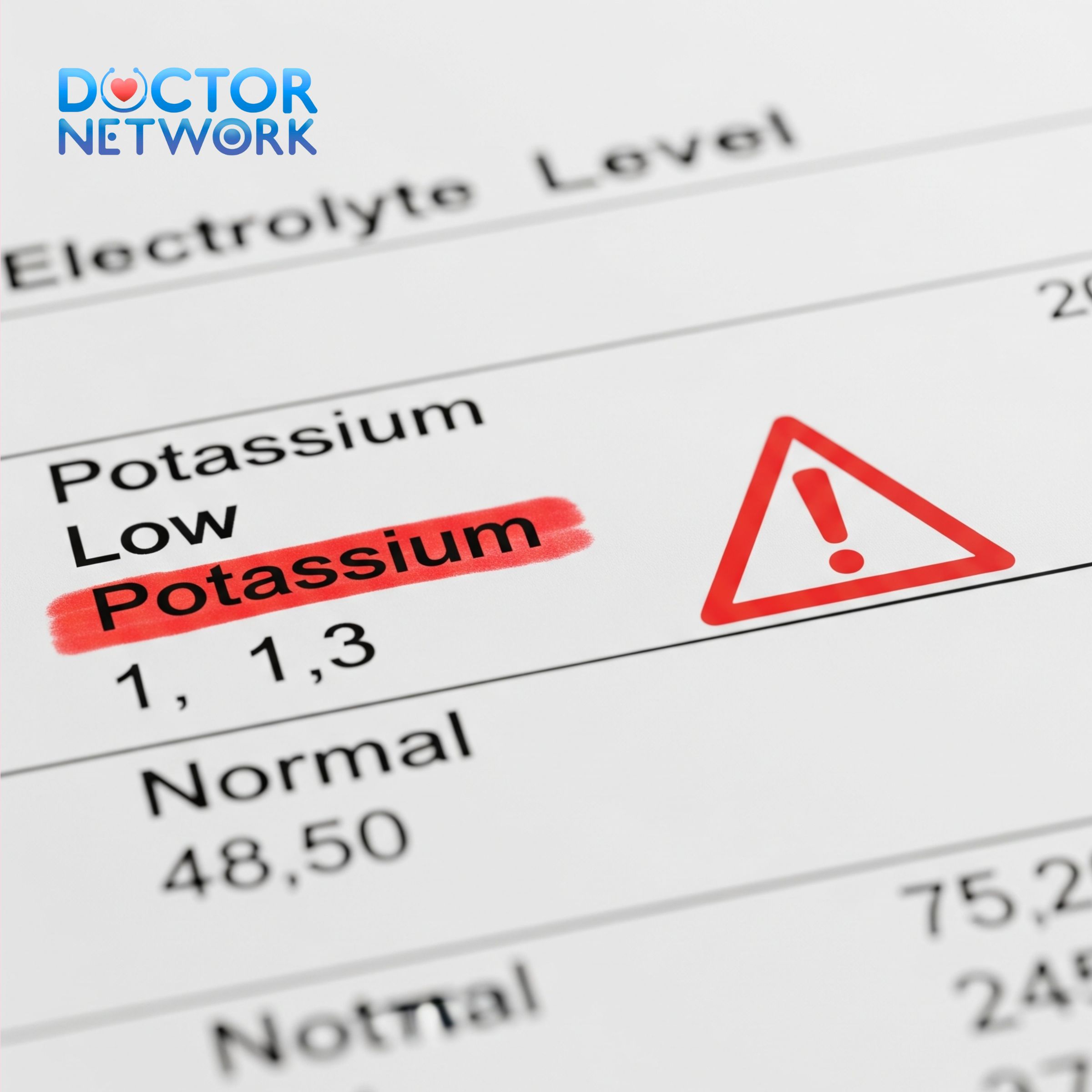Low potassium, medically termed hypokalemia, affects millions of people worldwide and represents one of the most common electrolyte disorders encountered in clinical practice. While this mineral deficiency alone does not directly indicate malignancy, emerging research reveals complex connections between potassium depletion and certain cancer types or their treatments. Understanding these relationships becomes crucial for both patients and healthcare providers, as hypokalemia can significantly impact treatment outcomes, quality of life, and overall prognosis in oncology settings.
Is low potassium a sign of cancer? – examining how malignancies can disrupt electrolyte balance, the impact of cancer therapies on potassium homeostasis, and evidence-based management strategies. We’ll cover diagnostic approaches, symptom recognition, treatment modalities, preventive measures, and when to seek immediate medical attention. Whether you’re a patient, caregiver, or healthcare professional, this article provides essential insights into managing hypokalemia in the context of cancer care.
Understanding Potassium and Hypokalemia
Potassium serves as the body’s primary intracellular cation, orchestrating vital physiological processes that maintain cellular integrity and organ function. This essential mineral enables proper nerve signal transmission, facilitates muscle contractions including cardiac rhythm regulation, and maintains optimal fluid balance throughout the body. Normal serum potassium concentrations typically range from 3.6 to 5.0 millimoles per liter (mmol/L), though reference ranges may vary slightly between laboratories.
What Potassium Does in Your Body
- Nerve Function: Potassium creates the electrochemical gradient necessary for nerve impulse transmission. Without adequate levels, neurons cannot properly depolarize and repolarize, leading to impaired communication between the brain and peripheral tissues.
- Muscle Function: All muscle tissue, particularly cardiac muscle, depends on potassium for contraction and relaxation cycles. The mineral works in conjunction with sodium and calcium to generate action potentials that trigger muscle fiber activation.
- Fluid Balance: Potassium regulates osmotic pressure within cells, controlling water distribution between intracellular and extracellular compartments. This function proves critical for maintaining blood pressure, kidney function, and cellular metabolism.
Common Causes of Hypokalemia
Potassium deficiency develops through various mechanisms, often involving multiple concurrent factors:
- Inadequate Dietary Intake: Modern diets frequently lack sufficient potassium-rich foods such as fruits, vegetables, legumes, and dairy products. The average Western diet provides only 50-60% of recommended daily potassium intake.
- Excessive Potassium Loss: Gastrointestinal losses through vomiting, diarrhea, or malabsorption disorders represent common pathways for potassium depletion. Renal losses occur with certain medications, hormonal imbalances, or kidney dysfunction.
- Pharmacological Causes: Diuretics, particularly loop and thiazide types, increase urinary potassium excretion. Laxatives, beta-agonists, insulin, and certain antibiotics also contribute to potassium depletion.
- Underlying Medical Conditions: Endocrine disorders such as hyperaldosteronism, hyperthyroidism, or Cushing’s syndrome can disrupt potassium homeostasis. Chronic kidney disease, inflammatory bowel disorders, and eating disorders also predispose individuals to hypokalemia.
The Complex Relationship Between Cancer and Low Potassium

The association between malignancy and potassium depletion involves multifaceted mechanisms rather than a simple cause-and-effect relationship. Cancer influences potassium levels through direct tumor effects, paraneoplastic phenomena, and treatment-related complications, creating a complex web of interactions that require careful clinical evaluation.
How Cancer Can Affect Potassium Levels
- Tumor-Induced Hormonal Disruption: Certain malignancies, particularly endocrine tumors, secrete hormones that directly affect potassium regulation. Adrenal adenomas or carcinomas may produce excess aldosterone, leading to primary hyperaldosteronism and subsequent potassium wasting. Ectopic ACTH syndrome, caused by lung, pancreatic, or pituitary tumors, results in cortisol overproduction and mineralocorticoid effects.
- Paraneoplastic Syndromes: These rare but significant conditions occur when the immune system’s response to cancer affects normal bodily functions. Syndrome of inappropriate antidiuretic hormone secretion (SIADH), commonly associated with lung cancer, can indirectly influence electrolyte balance. Anti-Hu antibodies in paraneoplastic encephalitis may affect hypothalamic-pituitary function, disrupting hormonal regulation of potassium.
- Direct Organ Impact: Gastrointestinal malignancies can impair nutrient absorption, cause chronic diarrhea, or create mechanical obstructions that reduce food intake. Renal cell carcinoma or metastatic disease to the kidneys compromises filtration capacity and electrolyte regulation. Liver metastases may affect protein synthesis and hormone metabolism, indirectly influencing potassium homeostasis.
Cancer Treatments and Potassium Depletion

Oncological therapies represent a significant risk factor for developing hypokalemia, with both acute and chronic effects on electrolyte balance. Treatment-induced potassium depletion can compromise therapeutic efficacy, increase toxicity risks, and negatively impact patient outcomes.
Chemotherapy-Related Hypokalemia
- Platinum-Based Agents: Cisplatin, carboplatin, and oxaliplatin cause dose-dependent renal tubular damage, leading to persistent magnesium and potassium wasting. This nephrotoxicity can persist for months or years after treatment completion.
- Novel Targeted Therapies: Monoclonal antibodies, tyrosine kinase inhibitors, and immune checkpoint inhibitors can trigger immune-related adverse events affecting kidney function or causing severe diarrhea.
- Antiemetic Complications: While preventing chemotherapy-induced nausea and vomiting, some antiemetics may cause electrolyte imbalances. Additionally, breakthrough emesis results in direct potassium losses through gastric fluid.
Radiation Therapy Effects
Radiation to abdominal or pelvic regions can cause enteritis, leading to malabsorption and electrolyte losses. Renal irradiation may result in nephritis and reduced kidney function, affecting potassium regulation years after treatment.
Secondary Treatment Effects
Cancer treatments frequently cause appetite suppression, mucositis, taste alterations, and gastrointestinal dysfunction. These side effects reduce nutritional intake and absorption, contributing to progressive potassium depletion during extended treatment courses.
When to Seek Medical Advice
Recognition of concerning symptoms and appropriate timing of medical intervention can prevent serious complications and optimize treatment outcomes. Cancer patients face unique risks that require heightened vigilance and lower thresholds for seeking professional evaluation.
Immediate Medical Attention Indicators
Emergency Situations Requiring Urgent Care:
- Severe muscle weakness affecting breathing or swallowing
- Irregular heartbeat, chest pain, or palpitations
- Mental confusion, disorientation, or altered consciousness
- Persistent vomiting preventing fluid or medication intake
- Signs of severe dehydration or kidney dysfunction
High-Priority Symptoms:
- Progressive muscle weakness interfering with daily activities
- New or worsening constipation lasting more than three days
- Persistent fatigue unresponsive to rest
- Muscle cramps or spasms not relieved by position changes
- Mood changes or cognitive difficulties
Preventive Care and Regular Monitoring
Routine Assessment Recommendations:
- Pre-treatment baseline electrolyte assessment
- Regular monitoring during active treatment phases
- Post-treatment surveillance for late effects
- Annual comprehensive metabolic panels for survivors
Risk-Based Screening: Patients with specific risk factors may require more intensive monitoring:
| Risk Category | Monitoring Frequency | Special Considerations |
|---|---|---|
| High-risk (multiple factors) | Weekly during treatment | Consider preventive supplementation |
| Moderate-risk | Bi-weekly during treatment | Adjust based on symptoms |
| Low-risk | Monthly during treatment | Standard monitoring protocols |
Related Questions Regarding “Is Low Potassium A Sign of Cancer?”
1. Is low potassium a sign of cancer?
Low potassium levels, known as hypokalemia, are not commonly a direct sign of cancer. While hypokalemia can be associated with many health issues, it is usually not caused directly by cancer itself. However, certain cancers and their treatments can lead to low potassium levels indirectly through various mechanisms such as vomiting, diarrhea, or hormone imbalances.
2. How can cancer cause low potassium levels?
Cancer can cause low potassium through several indirect ways:
Gastrointestinal cancers may cause chronic vomiting or diarrhea, leading to potassium loss.
Some cancers produce hormone-like substances that increase potassium excretion by the kidneys, mimicking conditions like hyperaldosteronism.
Tumor lysis syndrome in aggressive blood cancers can cause shifts in potassium levels during treatment.
Cancer treatments such as chemotherapy often cause side effects like vomiting and diarrhea, which can deplete potassium
3. Which types of cancer are more likely to be associated with low potassium?
Cancers that affect the gastrointestinal tract (stomach, pancreas, intestines), adrenal glands, kidneys, or blood (like leukemia and lymphoma) are more commonly linked to low potassium. These cancers may disrupt potassium balance either by affecting absorption, causing hormone imbalances, or through treatment side effects.
4. What symptoms might indicate low potassium in cancer patients?
Symptoms of low potassium include muscle weakness, cramps, fatigue, irregular heartbeats, nausea, vomiting, and abdominal pain. Severe hypokalemia can cause muscle paralysis, heart arrhythmias, confusion, and difficulty breathing, which require immediate medical attention. These symptoms may overlap with cancer symptoms or treatment side effects, so monitoring potassium levels is important.
5. How is low potassium diagnosed and managed in cancer patients?
Diagnosis involves blood tests to measure potassium levels, urine tests to assess potassium loss, and sometimes imaging or hormone tests to find underlying causes like tumors or adrenal dysfunction. Management includes treating the underlying cause, correcting potassium deficiency through diet or supplements, and monitoring during cancer treatment to prevent complications.
Conclusion
The relationship between low potassium and cancer represents a multifaceted clinical challenge that extends far beyond simple electrolyte replacement. While hypokalemia alone does not serve as a direct diagnostic indicator of malignancy, the complex interactions between cancer, its treatments, and potassium homeostasis require sophisticated understanding and management approaches.
Successful management of hypokalemia in cancer patients demands comprehensive assessment of underlying causes, recognition that treatment-related factors often predominate, and implementation of individualized intervention strategies. The integration of conventional medical approaches with complementary therapies, nutritional support, and psychosocial care enhances both clinical outcomes and quality of life.
Prevention remains the cornerstone of optimal care, emphasizing proactive dietary modifications, lifestyle adjustments, and vigilant monitoring throughout the cancer journey. Healthcare teams must maintain heightened awareness of potassium-related complications while educating patients and caregivers to recognize concerning symptoms early.
The consequences of inadequately managed hypokalemia—including increased treatment toxicity, compromised therapeutic efficacy, and reduced quality of life—underscore the critical importance of addressing electrolyte imbalances as integral components of comprehensive cancer care. Regular monitoring, prompt intervention, and coordinated multidisciplinary management can significantly improve outcomes for patients dealing with both cancer and its associated complications.
For patients experiencing symptoms suggestive of electrolyte imbalance, immediate consultation with healthcare providers enables prompt diagnosis through simple blood tests and implementation of appropriate treatment strategies. Early recognition and intervention remain the most powerful tools for preventing serious complications and maintaining optimal health throughout cancer treatment and recovery.
The future of cancer care increasingly recognizes that managing the whole person—not just the disease—leads to better outcomes. Understanding and addressing conditions like hypokalemia within this broader context represents an essential component of modern, patient-centered oncological practice.
Scientific References
1. Paraneoplastic Syndromes
Ectopic ACTH Syndrome: Some cancers, particularly small cell lung cancer (SCLC), can produce adrenocorticotropic hormone (ACTH). This leads to excessive cortisol production (Cushing’s syndrome) and mineralocorticoid excess, which causes sodium retention and potassium excretion, resulting in hypokalemia and metabolic alkalosis.
Evidence:
Title: “Ectopic ACTH Syndrome”
Author(s): Isidori AM, Kaltsas GA, Pozza C, et al.
Source: Frontiers in Hormone Research, 2006, Vol. 35, pp. 143-156.
Key Finding: This review discusses ectopic ACTH production by various tumors, including lung cancer, pancreatic cancer, and thymic carcinoids, highlighting hypokalemia as a common metabolic disturbance.
Note: While not a direct study on just hypokalemia, it’s a key component of the syndrome.
Evidence:
Title: “Paraneoplastic Syndromes”
Author(s): Pelosof, L. C., & Gerber, D. E.
Source: Mayo Clinic Proceedings, 2010, 85(9), 838–854.
Key Finding: This review extensively covers paraneoplastic syndromes. It mentions that ectopic ACTH secretion can lead to hypokalemia, often severe, particularly in patients with SCLC.
Renal Tubular Dysfunction (e.g., Fanconi Syndrome): Some cancers can cause generalized proximal renal tubular dysfunction, leading to the loss of various substances in the urine, including potassium.
Evidence:
Title: “Acquired Fanconi syndrome in adults”
Author(s): Klootwijk, E. J., Reichold, M., Helip-Wooley, A., et al.
Source: Nephrology Dialysis Transplantation, 2020, 35(3), 377-386.
Key Finding: This review mentions multiple myeloma and other hematologic malignancies as potential causes of acquired Fanconi syndrome, which is characterized by hypokalemia, hypophosphatemia, glycosuria, and aminoaciduria.
2. Direct Tumor Effects
Primary Aldosteronism (Conn’s Syndrome): Adrenal adenomas (benign tumors) or adrenal carcinomas (malignant) can overproduce aldosterone, leading to sodium retention, hypertension, and significant potassium loss.
Evidence:
Title: “Primary Aldosteronism: A Clinical Review”
Author(s): Funder, J. W.
Source: Steroids, 2019, 142, 2-6.
Key Finding: This review discusses the pathophysiology of primary aldosteronism, where hypokalemia is a classic, though not universal, finding due to aldosterone-induced renal potassium excretion.
Renin-Secreting Tumors (Reninoma): Rare tumors of the juxtaglomerular cells of the kidney can produce excessive renin, leading to secondary hyperaldosteronism, hypertension, and hypokalemia.
Evidence:
Title: “Reninoma: a rare cause of curable hypertension and hypokalemia”
Author(s): Corvol P, Pinet F, Plouin PF, et al.
Source: Advances in Nephrology from the Necker Hospital, 1995, 24, 293-310.
Key Finding: This article (older but foundational) describes reninomas and their clinical presentation, including severe hypokalemia.
3. Side Effects of Cancer Treatment
Chemotherapy-Induced Hypokalemia: Certain chemotherapy drugs are known to cause kidney damage leading to potassium wasting.
Cisplatin: A common chemotherapeutic agent.
Evidence:
Title: “Cisplatin nephrotoxicity”
Author(s): Miller, R. P., Tadagavadi, R. K., Ramesh, G., & Reeves, W. B.
Source: Toxicology and Applied Pharmacology, 2010, 244(2), 117–126.
Key Finding: This review discusses cisplatin-induced nephrotoxicity, noting that hypomagnesemia and hypokalemia are common electrolyte disturbances due to renal tubular damage.
Evidence:
Title: “Mechanisms of cisplatin-induced renal damage and nephroprotection”
Author(s): Lajer, H., & Daugaard, G.
Source: Cancer Chemotherapy and Pharmacology, 1999, 43(1), 1-11.
Key Finding: Details how cisplatin affects renal tubules, leading to magnesium and potassium wasting.
Ifosfamide: Another alkylating agent.
Evidence:
Title: “Ifosfamide nephrotoxicity in children”
Author(s): Skinner, R., Pearson, A. D. J., Price, L., Coulthard, M. G., & Craft, A. W.
Source: Pediatric Nephrology, 1990, 4(6), 570-574. (Older but illustrative of early findings).
Key Finding: Describes renal tubular dysfunction, including hypokalemia, as a complication of ifosfamide treatment.
Targeted Therapies: Some newer targeted therapies can also cause electrolyte imbalances.
EGFR inhibitors (e.g., cetuximab, panitumumab):
Evidence:
Title: “Hypomagnesemia and other electrolyte abnormalities in patients treated with cetuximab”
Author(s): Vincenzi, B., Santini, D., Tonini, G., et al.
Source: British Journal of Cancer, 2006, 95(10), 1312-1317.
Key Finding: Reports a high incidence of hypomagnesemia in patients treated with cetuximab, which can often be accompanied by hypokalemia, as magnesium is crucial for potassium reabsorption in the kidneys.
4. Cancer-Related Complications
Gastrointestinal Losses: Vomiting and diarrhea, common in cancer patients (either due to the disease itself or its treatment), can lead to significant potassium loss.
General Pathophysiology Reference:
Title: “Potassium Disorders”
Author(s): Gennari, F. J.
Source: New England Journal of Medicine, 1998, 339(7), 451-458.
Key Finding: This classic review discusses causes of hypokalemia, including gastrointestinal losses (vomiting, diarrhea) which are highly relevant in cancer patients.
Specific Cancers:
Acute Myeloid Leukemia (AML): Hypokalemia can occur in AML, sometimes due to lysozymuria (excretion of lysozyme in urine, which can damage renal tubules) or direct leukemic infiltration of the kidneys.
Evidence:
Title: “Renal manifestations of acute leukemia”
Author(s): Mir, M. A., Brabin, B., Tang, O. T., Leyland, M. J., & Delamore, I. W.
Source: Nephron, 1985, 39(3), 175-180. (Older study, but foundational)
Key Finding: Discusses renal complications in leukemia, including hypokalemia, sometimes associated with lysozymuria in monocytic or myelomonocytic leukemia.
Evidence:
Title: “Hypokalemia in acute myeloid leukemia”
Author(s): Yeung, S. C., Lin, C. K., Li, A. F., & Hui, P. K.
Source: Archives of Internal Medicine, 1993, 153(11), 1377-1379.
Key Finding: This study investigated hypokalemia in AML patients, noting its association with certain AML subtypes (M4, M5) and lysozymuria.
Kiểm Duyệt Nội Dung
More than 10 years of marketing communications experience in the medical and health field.
Successfully deployed marketing communication activities, content development and social networking channels for hospital partners, clinics, doctors and medical professionals across the country.
More than 6 years of experience in organizing and producing leading prestigious medical programs in Vietnam, in collaboration with Ho Chi Minh City Television (HTV). Typical programs include Nhật Ký Blouse Trắng, Bác Sĩ Nói Gì, Alo Bác Sĩ Nghe, Nhật Ký Hạnh Phúc, Vui Khỏe Cùng Con, Bác Sỹ Mẹ, v.v.
Comprehensive cooperation with hundreds of hospitals and clinics, thousands of doctors and medical experts to join hands in building a medical content and service platform on the Doctor Network application.

























